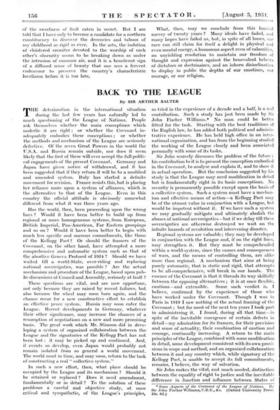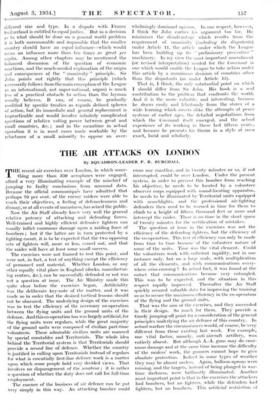BACK TO THE LEAGUE
By SIR ARTHUR SALTER
THE deterioration in the international situation during the last few years has naturally led to much questioning of the League of Nations. People ask themselves whether the main conceptions which underlie it are right ; or whether the Covenant in- adequately embodies these conceptions ; or whether the methods and mechanism of the League are seriously defective. Of the seven Great Powers in the world the U.S.A. and Russia remain outside, nor does it seem likely that the first of these will ever accept the full politi- cal engagements of the present Covenant. Germany and Japan have given notice of withdrawal, and it has been suggested that if they return it will be to a modified and amended system. Italy has started a definite movement for revision. France resists this, but is placing her reliance more upon a system of alliances, which is the alternative to that of the League. Even in this country the official attitude is obviously somewhat different from what it was three years ago.
Has the world, then, been proceeding upon the wrong lines ? Would it have been better to build up from regional or more homogeneous systems, from European, British Imperial, Pan-American, Far Eastern groupings and so on ? Would it have been better to begin with much less specific and onerous commitments, like those of the Kellogg Pact? Or should the framers of the Covenant, on the other hand, have attempted a more comprehensive and automatic system such as that of the abortive Geneva Protocol of 1924? Should we have waited till a world-State, over-riding and replacing national sovereignties, was possible ? Are the actual mechanism and procedure of the League, based upon pub- lic discussions at Council and Assembly, seriously at fault ?
• These questions are vital, and are now opportune, not only because they are raised by recent failures, but also because the wheel may soon turn again, and the chance recur for a new constructive effort to establish an effective peace system. Russia may soon enter the League. Recent developments in Germany, whatever their other significance, may increase the chances of a resumption of negotiations on a new and more promising basis. The great work which Mr. Stimson did in deve- loping a system of organized collaboration between the League and the signatories of the Kellogg Pact has not been lost ; it may be picked up and continued. And, if events so develop, even Japan would probably not remain isolated from so general a world movement. The world must in time, and may soon, return to the task of constructing a real" collective system."
In such a new effort, then, what place should be occupied by the League and its mechanism ? Should it be retained or replaced ? Does it need amendment, fundamentally or in detail ? To the solution of these problems a careful and objective study, at once critical and sympathetic, of the League's principles, as tried in the experience of a decade and a half, is a real contribution. Such a study has just been made by Sir John Fischer Williams.* No man could be better fitted for the task. Starting with the best traditions of the English law, he has added both political and adminis- trative experience. He has held high office in an inter- national organization, and has from the beginning studied the working of the. League closely and been associated personally with some of its tasks.
Sir John scarcely discusses the problem of the future ; his contribution to it is to present the conception embodied in the Covenant, to analyse and explain it, and to show it in actual operation. But the conclusion suggested by his study is that the League may need modification in detail but is fundamentally right in its basic conceptions. No security is permanently possible except upon the basis of a collective system. Such a system must have a mechan- ism and effective means of action—a Kellogg Pact may be of the utmost value in conjunction with a League, but would be impotent without it. If we have such a system we may gradually mitigate and ultimately abolish the abuses of national sovereignties—but if we delay till these sovereignties are otherwise destroyed we wait on the infinite hazards of revolution and intervening disaster.
Regional systems are valuable; they may be developed in conjunction with the League and, if on the right lines, may strengthen it. But they must be comprehended within a world-system, since the causes and consequences of wars, and the means of controlling them, are alike more than regional. A mechanism that aims at being purely automatic, that is static and rigid, that attempts to be all-comprehensive, will break in our hands. The essence of the Covenant is that it threads its way skilfully between the opposing alternatives ; it is at once flexible, cautious—and extensible. Some such verdict is, I believe, confirmed by the experience of those who have worked under the Covenant. Though I was in Paris in 1919 I saw nothing of the actual framing of the Covenant ; but for most of the next ten years I took part in administering it. I found, during all that time—in spite of the inevitable emergence of certain defects in detail—my admiration for its framers, for their prevision and sense of actuality, their combination of caution and courage, continually increasing. A return to the main principles of the League, combined with some modification in detail, some development consistent with its own provi- sions in scope and method, and an organized collaboration between it and any country which, while signatory of the Kellogg Pact, is unable to accept its full commitments, remains, I believe, the way of salvation.
Sir John makes the vital, and much needed, distinction between the equality of right to justice and the inevitable difference in function and influence between States of • Some Aspects of the Covenant of the League of Nations. By Sir John Fischer Williams, C.B:E., &e. (Oxford University Press. 10s. 6d.) different size and type. In a dispute with France Switzerland is entitled to equal justice. But in a decision as to what should be done on a general world problem it is both unreasonable and impossible that the smaller country should have an equal influence—which would mean an influence more than ten times as great per capita. Among other chapters may be mentioned the balanced discussion of the question of economic sanctions, and the much-needed explanation of the origin and consequences of the " unanimity " principle. Sir John points out rightly that this principle (which necessarily follows from the main conception of the League as an international, not super-national, organ) is much less of a practical obstacle to action than the layman usually believes. It can, of course, be gradually modified by specific- treaties as regards defined spheres of action, but its immediate and general replacement is impracticable and would involve infinitely complicated .questions of relative voting power between great and small countries, &e. ; and in the meantime in actual operation it is in most cases made workable by the reluctance of a small minority to oppose an over- whelmingly dominant opinion. In one respect, however, I think Sir John carries his argument too far. He minimizes the disadvantage which results from the requirement of unanimity (including the disputants) under Article 11, the article under which the League has been building up its " preliminary preventive " machinery. In my view the most important amendment (or revised interpretation) needed for the Covenant, is one which would enable the League to take action under this article by a unanimous decision of countries other than the disputants (as under Article 15).
That is, I think, the only substantial point on which I should differ from Sir John. His book is a real contribution to the problem that confronts the world. And it is the more valuable, and interesting, because he draws easily and felicitously from the stores of a wide learning which covers alike the attempts at peace systems of earlier ages. the detailed negotiations from which the Covenant itself emerged, and the actual experience of its working in these last fifteen years ; and because he presents his theme in a style at once exact, lucid and scholarly.































 Previous page
Previous page